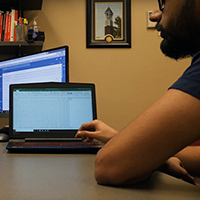
Driving Data
The cost and benefits of usage-based auto insurance
Having a technological device collect data on your every turn, stop and driving maneuver may be annoying, but new research from Purdue’s Krannert School of Management and the University of British Columbia shows that people’s driving techniques may actually improve when they know their insurance company is watching.
Titled “Sensor Data and Behavioral Tracking: Does Usage-Based Auto Insurance Benefit Drivers?” and recently published in Marketing Science, the paper was co-authored by Ting Zhu, an associate professor of marketing at Krannert, Professor Charles Weinberg at the University of British Columbia Sauder School of Business, and UBC Sauder PhD candidate Miremad Soleymanian.
“Companies across a broad spectrum of industries are increasingly using new technologies based on real-time consumer data to increase their business productivity,” Zhu explains. “In the highly competitive auto insurance industry, for example, insurers are trying to more precisely predict risks, sharpen pricing strategies and provide better value to their customers.
“As the price of sensors and communication devices continues to fall, and as the value of sensor-based information is more evident, usage-based insurance is becoming a popular alternative to traditional automobile insurance.”
With usage-based insurance, or UBI, a telematics device is installed in your car that records such details as how far you drive every day, where you drive, and how quickly you accelerate, brake or make turns. Insurance companies use this information to adapt their rates accordingly, offering lower premiums to better drivers. The research examines if and how people change their driving behavior after adopting this new form of insurance.
Using data from a major U.S. auto insurance company collected on new customers in 15 states, the researchers observed UBI subscribers’ driving behavior over varying periods and found that those who use telematics reduced the number of hard brakes and improved their overall UBI score.
“Women in particular seem more likely to respond to the knowledge that their insurance rates will increase as a result of their bad habits and change their behavior accordingly,” the researchers say. “Young drivers also benefited from the device.”
According to Strategy Meets Action, a strategic advisory services firm in the insurance industry, more than one in three auto insurance carriers are expected to use telematics UBI by 2020. Given the ongoing data breaches in companies representing nearly industry, however, some consumers might be wary of trading their privacy for an insurance discount.
Because it’s typically a voluntary option on most policies, however, drivers with privacy concerns won’t be likely to install a telematics device.The tradeoff for those who rely on UBI includes the benefits of being encouraged to drive more safely, which results in fewer accidents.
“We find evidence that negative feedback and economic incentives correlate with greater improvement in driving behavior,” Zhu says. “This suggests that by sharing private consumer information with the insurer, UBI can benefit consumers who become better drivers, as well as society from improved road safety.”
Still, she cautions, showing a direct personal benefit of revealing private information in a large-scale setting is novel at best. “The data is so rich,” Zhu says. “Further examination of the impact of privacy concerns on participation in such monitoring programs is clearly needed.”






